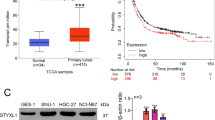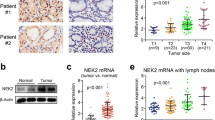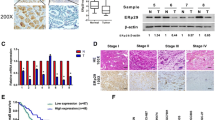Abstract
Backgrounds
Epidermal growth factor receptor kinase substrate 8-like 3 (EPS8L3) functions as a substrate of EGFR, and regulates signalings involved in cell proliferation, differentiation, and migration. The oncogenic role of EPS8L3 in distinct tumors was widely investigated, while the effect of EPS8L3 on gastric cancer (GC) remains unknown.
Objectives
To investigate the effect of EPS8L3 on gastric cancer (GC).
Results
EPS8L3 was elevated in GC tissues and cells, and predicted poor prognosis in the patients. Over-expression of EPS8L3 increased cell viability and reduced apoptosis of GC. However, cell viability of GC was decreased and the apoptosis was promoted by silence of EPS8L3. Knockdown of EPS8L3 down-regulated protein expression of p62, while up-regulated Beclin1 and LC3-II/LC3-I in GC cells. Phosphorylation of PI3K, AKT, and mTOR in GC cells was inhibited by EPS8L3 silence.
Conclusion
EPS8L3 functioned as an oncogene in GC through suppression of cell apoptosis and autophagy via activation of PI3K/AKT/mTOR signaling.






Similar content being viewed by others
References
Bei S et al (2019) Inhibition of gastric cancer cell growth by a PI3K-mTOR dual inhibitor GSK1059615. Biochem Biophys Res Commun 511:13–20
Chen B et al (2020) Inhibition of EPS8L3 suppresses liver cancer progression and enhances efficacy of sorafenib treatment. Biomed Pharmacother 128:110284
Diacofotaki A, Loriot A, De Smet C (2022) Identification of tissue-specific gene clusters induced by DNA demethylation in lung adenocarcinoma: more than germline genes. Cancers 14(4):107
Fattahi S et al (2020) PI3K/AKT/mTOR signaling in gastric cancer: epigenetics and beyond. Life Sci 262:118513
Jin Qiu YZ, Xie M (2021) Chrysotoxine attenuates sevoflurane-induced neurotoxicity in vitro via regulating PI3K/AKT/GSK pathway. Signa Vitae 17:185–191
Keller S et al (2017) Evaluation of epidermal growth factor receptor signaling effects in gastric cancer cell lines by detailed motility-focused phenotypic characterization linked with molecular analysis. BMC Cancer 17:845–845
Li Q et al (2016) Epidermal growth factor receptor kinase substrate 8 promotes the metastasis of cervical cancer via the epithelial-mesenchymal transition. Mol Med Rep 14:3220–3228
Li P et al (2019) Upregulation of EPS8L3 is associated with tumorigenesis and poor prognosis in patients with liver cancer. Mol Med Rep 20:2493–2499
Li H et al (2021) E2F2 inhibition induces autophagy via the PI3K/Akt/mTOR pathway in gastric cancer. Aging (albany NY) 13:13626–13643
Miao Z-F et al (2014) Influence of different hypoxia models on metastatic potential of SGC-7901 gastric cancer cells. Tumor Biology 35:6801–6808
Newton AD et al (2015) Neoadjuvant therapy for gastric cancer: current evidence and future directions. J Gastrointest Oncol 6:534–543
Normanno N et al (2006) Epidermal growth factor receptor (EGFR) signaling in cancer. Gene 366:2–16
Qian H-R, Yang Y (2016) Functional role of autophagy in gastric cancer. Oncotarget 7:17641–17651
Song Z et al (2017) Progress in the treatment of advanced gastric cancer. Tumor Biol 39:1010428317714626
Wilde L, Tanson K, Curry J, Martinez-Outschoorn U (2018) Autophagy in cancer: a complex relationship. Biochem J 475:1939–1954
Xiu T, Guo Q, Jing F-B (2021) Facing cell autophagy in gastric cancer—What do we know so far? Int J Gen Med 14:1647–1659
Xuan Z et al (2020) EPS8L3 promotes hepatocellular carcinoma proliferation and metastasis by modulating EGFR dimerization and internalization. Am J Cancer Res 10:60–77
Yin S, Lan C, Pei H, Zhu Z (2015) Expression of interleukin 1β in gastric cancer tissue and its effects on gastric cancer. Onco Targets Ther 9:31–35
Yu Y-F et al (2017) Paclitaxel induces autophagy in gastric cancer BGC823 cells. Ultrastruct Pathol 41:284–290
Zhang J et al (2020) miR-345 inhibits migration and stem-like cell phenotype in gastric cancer via inactivation of Rac1 by targeting EPS8. Acta Biochim Biophys Sin 52:259–267
Acknowledgements
Not applicable.
Funding
Not applicable.
Author information
Authors and Affiliations
Contributions
LY designed the study and carried them out. LX supervised the data collection, analyzed the data, and interpreted the data. SJ prepared the manuscript for publication and reviewed the draft of the manuscript. All authors have read and approved the manuscript.
Corresponding author
Ethics declarations
Conflict of interests
The authors state that there are no conflicts of interest to disclose. Licai You declares that he/she has no conflict of interest; Lijing Xiao declares that he/she has no conflict of interest; Shuxuan Jin declares that he/she has no conflict of interest.
Ethics approval
This article does not contain any studies with human participants or animals performed by any of the authors.
Additional information
Publisher's Note
Springer Nature remains neutral with regard to jurisdictional claims in published maps and institutional affiliations.
Rights and permissions
About this article
Cite this article
You, L., Xiao, L. & Jin, S. EPS8L3 suppresses apoptosis and autophagy of gastric cancer through PI3K/AKT/mTOR signaling. Mol. Cell. Toxicol. 19, 373–381 (2023). https://doi.org/10.1007/s13273-022-00266-6
Accepted:
Published:
Issue Date:
DOI: https://doi.org/10.1007/s13273-022-00266-6




